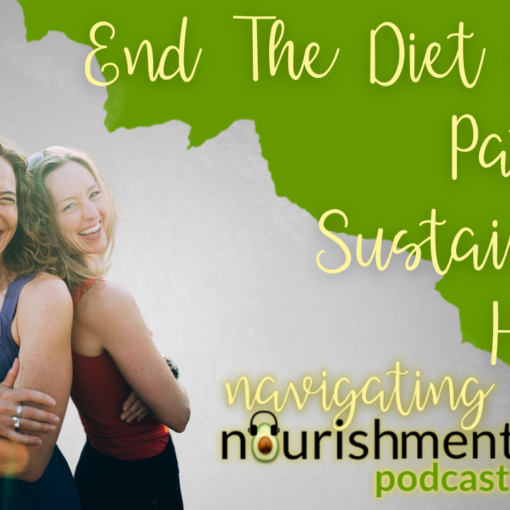Stop demonizing carbs.
Stop demonizing any kind of food. Food is food – it isn’t good or bad. Food is nourishing or not nourishing. It is healthful or not healthy, but it isn’t a moral issue. You aren’t “good” or “bad” because you ate something.
This is all diet culture thinking. Something we are trying to bring awareness to with our clients and followers.
The low-carb or no-carb craze is a part of this damaging diet culture. Let’s break it down.
Many popular diets hate carbs. This has created a generation of carb-phobics. Now, that’s just downright silly.
Carbohydrates are the main fuel for our bodies. We NEED carbohydrates. A lot of them.
Is this shocking? Read on.
Carbohydrates have many health benefits and should not be restricted from your diet for a plethora of reasons. Ok, we know that isn’t enough to convince you as you have been conditioned by our diet culture to avoid these foods. So, let me go on to explain why we absolutely need significant amounts of carbohydrates in our diet.
BRAIN ENERGY:
After consumption, carbohydrates break down into glucose which is the primary fuel that our brain utilizes for energy.
MENTAL HEALTH:
Quality carbohydrates include fiber which plays an incredibly important role in gut health by increasing healthy gut bacteria. Your brain and gut communicate all the time (mind/body connection). Numerous studies have shown that gut bacteria is associated with mental health.
SEROTONIN MESSAGING:
Eating enough carbohydrates is essential for the production of serotonin – a neurotransmitter that carries messages between nerve cells in the brain and throughout your body and plays a key role in such bodily functions such as mood, sleep, digestion, nausea, wound healing, bone health, blood clotting and sexual desire (Cleveland Clinic).
CORTISOL BALANCE:
Inadequate carbohydrate intake can increase cortisol levels. This hormone plays an incredibly important role affecting nearly every organ system in your body, including: nervous system, immune system, cardiovascular system, respiratory system, reproductive systems, musculoskeletal system and integumentary system (skin, hair, nails, glands and nerves). (Cleveland Clinic)
BODY ENERGY:
Carbohydrates regulate blood sugar. Without carbohydrates, your blood sugar can drop too low and cause lethargy and irritation among other very health-damaging effects – especially if insufficient carbohydrates are the norm.
Let me pause here for a disclaimer.
We don’t like “nutritionism,” a word used by Michael Pollan, author, journalist and Knight Professor of Science and Environmental Journalism at the UC Berkeley Graduate School of Journalism. According to Pollan, nutritionism is a paradigm that assumes that it is the scientifically identified nutrients in foods that determine the value of individual food stuffs in the diet.
As Dr. Mark Hyman says, “People don’t eat ingredients; they eat food.” Nutritionism is a simplistic view of food and it is creating chaos with people’s health. Pollan argues that relying solely on information regarding individual nutrients has led people and policy makers to repeatedly make poor decisions relating to nutrition. We agree.
Which is why we concentrate on the whole person eating whole foods, not numbers.
OK, back to carbs.
Why are people afraid of them?
“They prevent me from losing weight.” “Carbs are what made this pot belly.” “When I cut carbs, I lose weight.”
Sound familiar?
Fact:
Carbohydrates have 4 calories per gram–exactly the same as protein: 4 calories per gram! The issue is that we often overeat low-nutrient carbohydrate heavy foods much more than protein. If that’s the case, then yes, the statements above may be true.
Let’s be clear on carbs.
Carbohydrates are not just from bread, pasta, rice, and sugars. They are generously present in super nourishing foods such as vegetables, beans, fruits, whole grains, dairy, and starchy tubers. Whole grains, vegetables, fruits, and beans are full of nutrients and fiber– a language our bodies know and function with well. White flour products, fruit juices, refined sugars, white rice, etc are highly processed and refined, which extracts the fiber and many nutrients from them. These are the foods that are often overeaten (mostly because they aren’t very satiating), causing the proverbial weight gain and other health issues.
How to get around this issue?
To get started, here are some considerations – in no particular order:
-
Choose quality.
Eat lots of green veggies, fruits, nuts, beans and whole grains and only a minimal refined foods such as white bread, white rice, and pastas.
-
Eat mindfully
Pay attention to quantity. Take your time. Tune in. Notice your body’s signals of hunger and satiety.
-
Eat real, whole foods as much as possible.
Fruit vs candy; honey or maple syrup vs white sugar or corn syrups; water vs flavored sodas, concentrated juices or sugar added drinks.
-
Mind the time.
(And this goes for any food, not just carbs.) Have your last meal at least 3 to 4 hours before going to bed and avoid “grazing” or snacking throughout the day.
We don’t prescribe a formula for how many grams of carbs you need. We can work with you to determine what might fit well based on your body type, activity, sleep and stress environment.
One final, overarching note. The industry tries to box us into being one-size fits all (even when they claim they aren’t). That’s sloppy science. We are each truly unique.
Because of this, each and every one or our bodies requires different amounts of dietary nutrients – even before you add in all the other factors of body type, activity level, stressors, sleep quality and quantity, environment, and many more. Being tied to a number that you got from a formula on a website (respected as it may be) isn’t helpful when looking at all the other moving parts of our lives.
Bottom line:
How are you feeling lately with the foods you are eating? If you don’t feel great, connect with us and we can help you figure out what is best for you.
For one of our nutrient dense delicious recipes with bountiful carbohydrates, click here.






